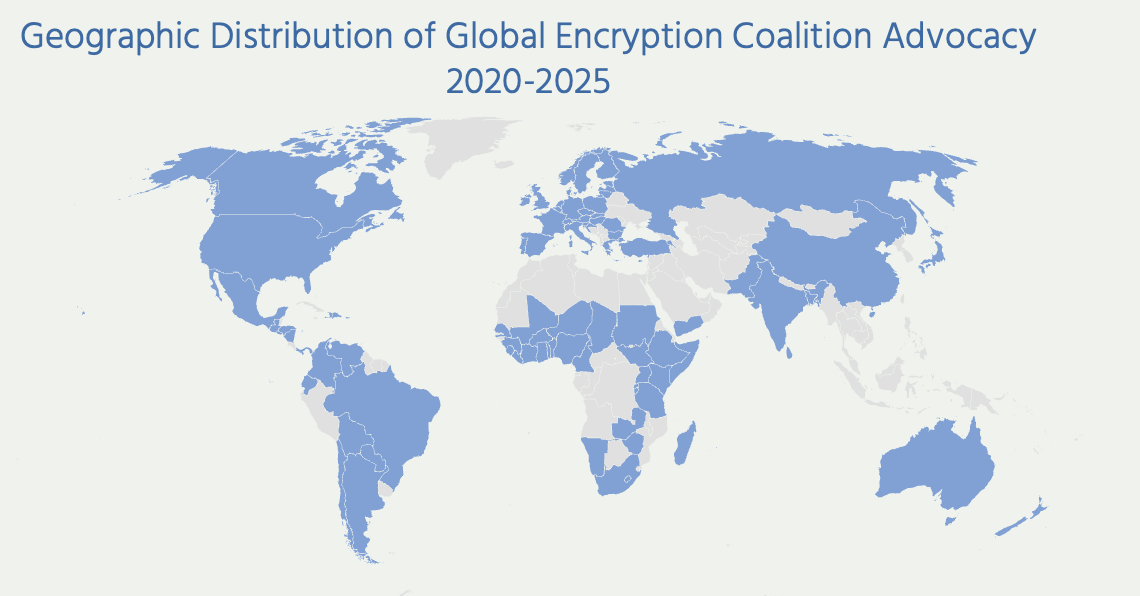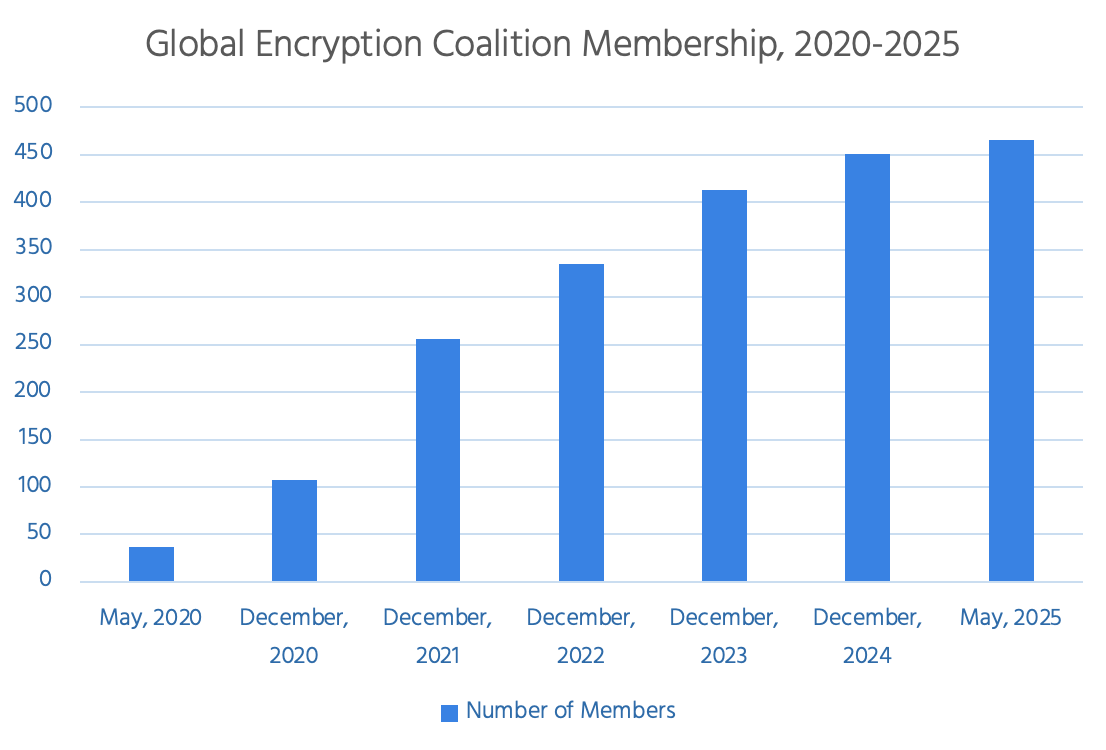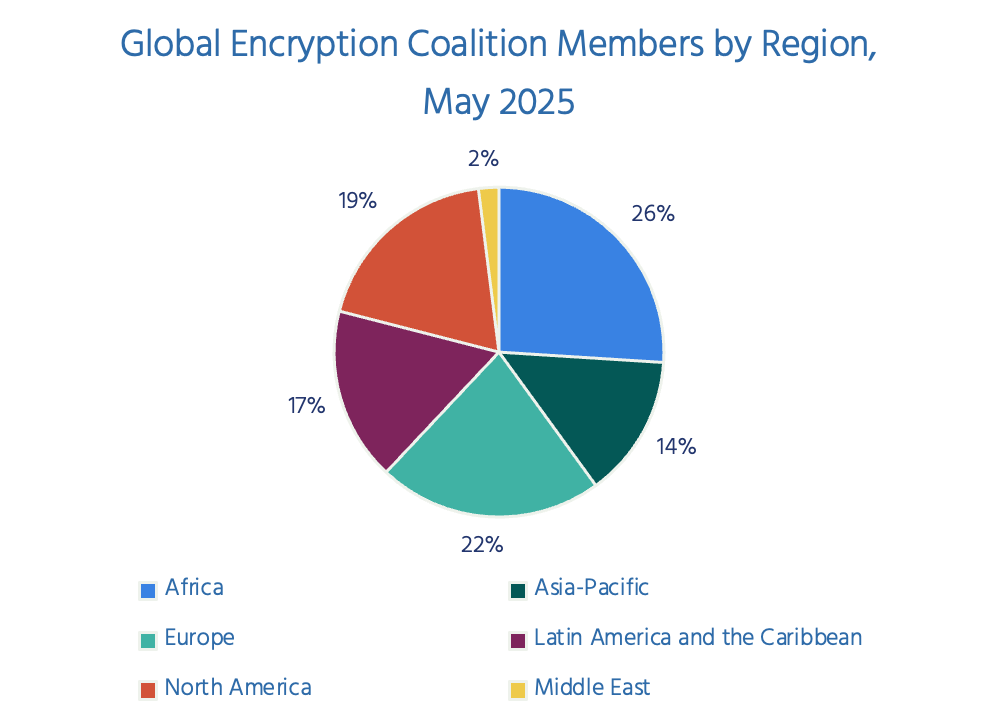In the five years since its launch on May 14 2020, the Global Encryption Coalition (GEC) and its members have reshaped the worldwide debate around encryption.
The Coalition started during uncertain times, as the world faced the first few months of a global pandemic. With just 37 civil society members at its founding, the Coalition was formed with the purpose of promoting and defending the use of strong encryption around the world. Since then, the Coalition has grown to include 466 members from 108 countries, including civil society organizations, companies, and individual cybersecurity experts that have worked together to effectively inform and impact global policy debates around encryption.

With the ability to bring global attention to legislative threats to encryption, the GEC has successfully defended strong encryption against existential threats. Through proactive advocacy, its members have also changed some governments from encryption opponents into allies, changing the nature of the encryption debate at regional levels. Between proactive and defensive advocacy, GEC members have advocated for encryption in at least 93 countries since 2020.

GEC efforts have put pressure on legislative proposals that threatened encryption in countries including Australia, Brazil, the European Union, France, India, Sweden, Turkey, the United Kingdom, and the United States, often preventing or mitigating harm to encryption as a result. One of the Coalition’s earliest advocacy wins was in Belgium in 2021, where GEC members successfully pressured the Belgian Government to scrap a proposed law to backdoor end-to-end encryption. As the Center for Democracy and Technology’s then Chief Technology officer, Mallory Knodel, wrote at the time, “the GEC members’ efforts did not simply stall a harmful piece of legislation, they were successful in fully eradicating the parts of the law that would have put a backdoor in encrypted communications.”
In many countries, GEC members have helped stall or prevent legislation from passing. However, even where bad legislation has passed, the GEC has often secured key concessions. In 2023, when the United Kingdom passed its Online Safety Bill, the UK government acknowledged that it would not use its most dangerous powers until a safe technology existed for them to do so.
Since 2020, several governments have been transformed into encryption allies. In 2024, the Chilean government identified encryption as a right for every person in Chile. And in Europe, a group of EU member states have actively stood up against threats to strong encryption at the EU level. In 2020, this would have been unthinkable. In Canada, the former Minister of Justice Arif Virani credited encryption advocates for positively informing Canada’s C63 Online Harms Act, legislation that seeks to address online harms without jeopardising privacy messaging services and encryption.
Beyond governments, the Global Encryption Coalition’s membership has helped build grassroots global understanding of the importance of strong encryption. Since 2021, the GEC has held its annual Global Encryption Day on October 21. A global day of action, on Global Encryption Day GEC members have regularly held events in more than 60 countries. These events have ranged from public street protests to high level panels with policymakers, to encryption training at schools, among others. The Global Encryption Coalition has also trained civil society organizations with stakes in encryption, empowering advocates and growing the movement.

Over the coming years, the fight to protect encryption will be as vital as ever. But the Global Encryption Coalition’s five years of success make it clear: when we come together to fight for encryption, our diverse voices bring compelling arguments that convince decision-makers to make the choice to protect encryption.
Congratulations to the Global Encryption Coalition and we’re excited to see what this community can do next!
